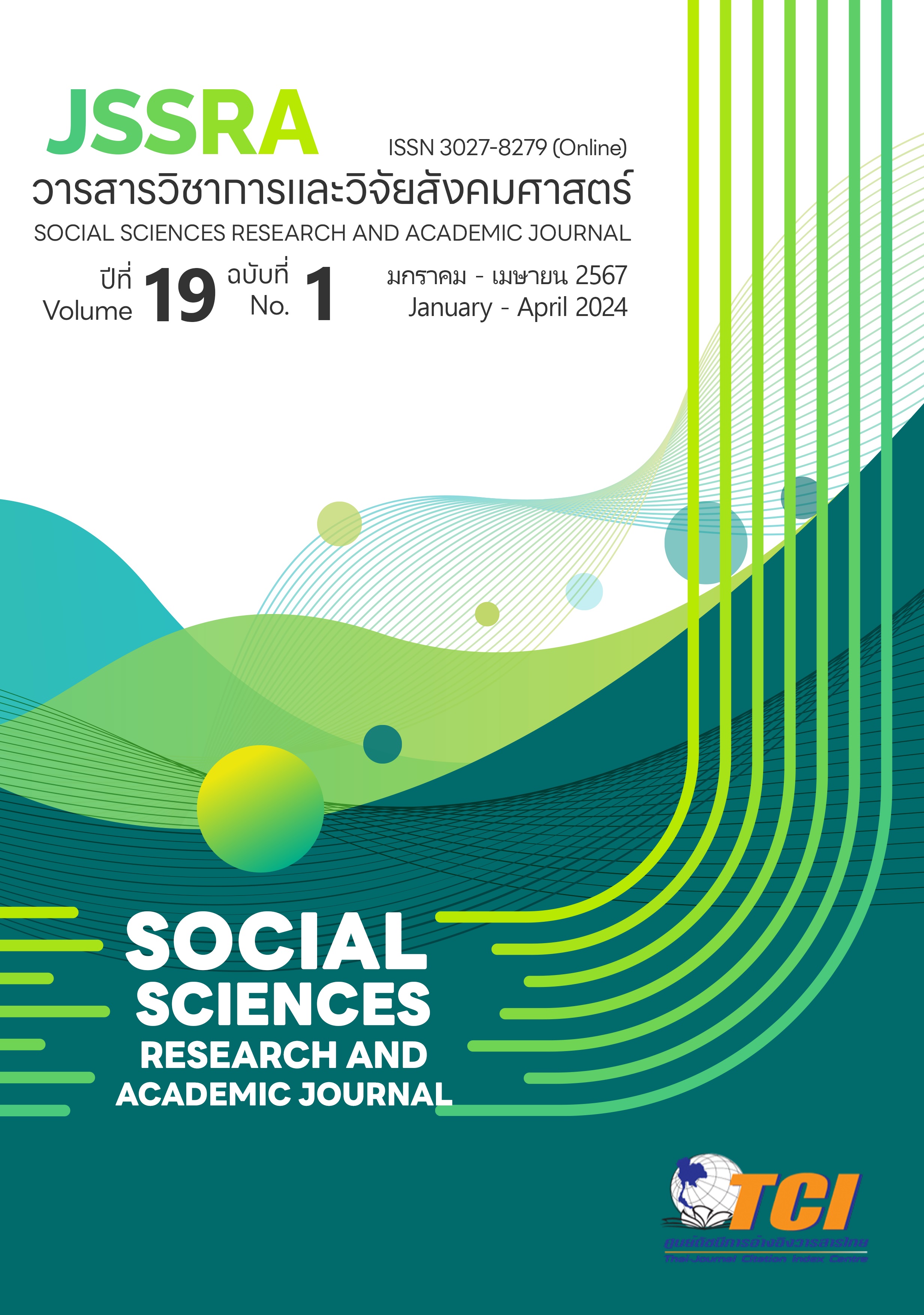Guideline for Promoting Self-Adaptation among Older Adults with Stage 1 Dementia through Process Art Activities
Main Article Content
Abstract
This academic article aimed to propose a guideline for promoting self-adaptation among older adults with stage 1 dementia through process art activities. The findings from the study revealed that both Thailand and foreign countries gave importance to encouraging perception and memory, emotion-focused therapy, and self-esteem. The use of process art activities could help train the nervous and brain system, reduce stress, practice fine motor skills, build self-worth and self-esteem increasingly. The guideline for promoting self-adaptation among older adults with stage 1 dementia through activities was based on the proposed process art or PCRS model. This is generated from the synthesis of documents and research relevant to art activities for older adults with stage 1 dementia, that has been held no longer than 10 years from reliable sources, both databases and websites for aging adults or websites providing activities for older adults. Details of PCRS model were as follow: 1) P: Process Art – experience is managed to meet things around older adults. Emphasis is placed on the 5 senses, 2) C: Collaboration – it helps older adults have interaction with friends and learn social skills through doing activities together, 3) R: Reflection – older adults’ life experiences are reflected through activities, 4) S: Self-Monitoring – older adults assess themselves by keeping a record of what happened in the past, observing, and writing suggestions to themselves that which point in the past can be improved.
Article Details
References
Alzheimer’s Disease Association. (2019). Impact of the Arts & Dementia Program. Retrieved March 25, 2023, from https://dementia.org.sg/wp-content/uploads/2021/03/Press-Release-ADA-Releases-Impact-of-the-Arts-and-Dementia-Research_Final_31219.pdf
Anandilokrit, P. (2021). Alzheimer’s Disease. Regional Health Promotion Center 9 Journal, 15(37), 392-398. (In Thai).
Anthology Senior Living. (2022). Art Therapy for Seniors with Dementia. Retrieved March 30, 2023, from https://www.anthologyseniorliving.com/blog/art-therapy-for-seniors-with-dementia
Basting, A. D. (2006). Arts in Dementia Care: This Is Not the End. It’s the End of This Chapter. Generations, 30(1), 16–20.
Basting, A. D., and Killick, J. (2003). The Arts and Dementia Care: A Resource Guide. New York: The National Center for Creative Aging. Retrieved March 30, 2023, from https://shorturl.asia/b1wgf
Flatt, J. D., Liptak, A., Oakley, M. A., Gogan, J., Varner, T., and Lingler, J. H. (2015). Subjective Experiences of an Art Museum Engagement Activity for Persons with Early Alzheimer’s disease and their Family Caregivers. American Journal of Alzheimer's Disease & Other Dementias, 30(4), 380-389.
Greenawalt, K. E., Orsega-Smith, E., Turner, J. L., Goodwin, S., and Rathie, E. J. (2019). The Impact of “The Art of Happiness” Class on Community Dwelling Older Adults: A Positive Psychology Intervention. Activities, Adaptation & Aging Dignified and Purposeful Living for Older Adults, 43(2), 118-132.
Hualmanop, S., Srithong, K., and Phra Suthirattanapandit, P. S. (2022). Development of Aesthetic Art Learning Innovation for The Nakhon Nayok Elderly School. Asia Pacific Journal of Religions and Cultures, 6(2), 14-28. (In Thai).
IPSR Mahidol University. (2022). Research Brief. Retrieved May 25, 2023, from https://shorturl.asia/gwPlj
Kanpangsri, N., and Kespichayawattana, J. (2014). The Effects of Art Activities Program on Self-Esteem of Older Persons with Early Dementia. Ramathibodi Nursing Journal, 20(2), 163-178.
Katkaew, K., and Boonyananta, S. (2023). Development of Non-Toxic Printmaking Activity Package to Promote Well-being for Elderly People. The Journal of Research and Academics, 6(2), 305-322.
Keyuranon, P. (2016). Ideas for Adding Happiness to a Senior's Life. Retrieved May 20, 2023, from https://www.stou.ac.th/stoukc/elder/main1_9.html
Mishra, K., Mishra, N., and Chaube, N. (2020). Expressive Arts Therapy for Subjective Happiness and Loneliness Feelings in Institutionalized Elderly Women: A Pilot Study. Asia Pacific Journal of Counselling and Psychotherapy, 12(1), 38-57.
Museum of Contemporary Art Australia. (2020). Artful: Art and dementia report. Retrieved March 25, 2023, from https://www.mca.com.au/files/documents/MCA_Artful_Report_July_2020.pdf
Nan, J. K. M., Pang, K. S. Y., Lam, K. K. F., Szeto, M. M. L., Sin, S. F. Y., and So, C. S. C. (2020). An Expressive Arts-Based Life Death Education Program for the Elderly: A Qualitative Study. Death Studies, 44(3), 131-140.
Newman, A., Goulding, A., and Whitehead, C. (2014). Contemporary Visual Art and the Construction of Identity: Maintenance and Revision Processes in Older Adults. International Journal of Heritage Studies, 20(4), 432-453.
Office of the National Economic and Social Development Council. (2019). Report of the Population Projections for Thailand 2010-2040 (Revision). Retrieved May 30, 2023, from https://shorturl.asia/zeAoc
Opening Minds through Art (OMA). (n.d.). Building Bridges Across Age and Cognitive Barriers through Art. Retrieved March 25, 2023, from https://scrippsoma.org/
Phinney, A. (2014). The Effect of a Community-Engaged Arts Program on Older Adults’ Well-being. Published online by Cambridge University Press.
Ponsawat, R. (2019). Lifelong Learning for Promoting Health Literacy among The Elderly in Thai Society. Journal of The Royal Thai Army Nurses, 20(3), 54-61. (In Thai).
Sangvanich, K. (2020). The Development of Arts Activities to Promote the Ability to Cope with Dementia and The Quality of Life of The Elderly by Integrating Art Education with Neuroscience. Bangkok: Chulalongkorn University. (In Thai).
Sarakitprija, V. (2020). Process Art. Retrieved May 30, 2023, from https://shorturl.asia/zeAoc
Saramart, O., Pitchayapaiboon, P., and Boonyananta, S. (2019). Art-based Using to Develop Well-being of Older Adults: The Systematic Review. Journal of Graduate Studies in Northern Rajabhat Universities, 9(2), 17-32. (In Thai).
Soontorntanaphol, N. (2022). Managing Music and Art Activities for the Elderly During the COVID-19 Pandemic. Parichart Journal Thaksin University, 35(3), 187-202. (In Thai).
Suwannapha, C., Sukjeen, A., Atawong, P., and Daowsang, W. (2021). Promotion and Learning Creative Arts of Youth and Aging in the Lanna Province Group. Journal of Buddhist Anthropology, 6(11), 516-528. (In Thai).
Tanta, K., et al. (2015). Nursing Student Innovation: Brain Training Box. Thai Red Cross Nursing Journal, 8(1), 113-121. (In Thai).
Thai Health Promotion Foundation. (2019). Incidence: Dementia Diseases for Older Adults. Retrieved May 24, 2023, from https://resourcecenter.thaihealth.or.th/media/mgKA
Thai Health Promotion Foundation. (2021). Decreased Income and Increased Cost Burden. Retrieved May 23, 2023, from https://shorturl.asia/XNktS
Wongsaree, C., and Phuntong, S. (2018). Dementia Syndrome in the Elderly: Nursing Care and Caring for Relatives Caregiver. HCU Journal of Health Science, 22(43-44), 166-179. (In Thai).


